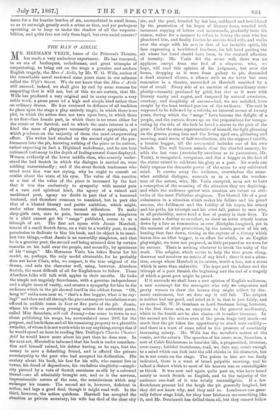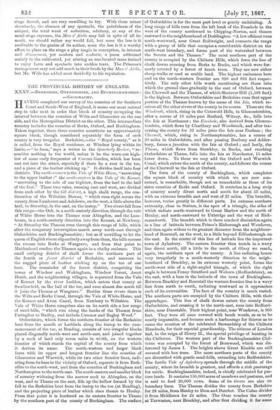THE MAN 0' AIRLIE.
MR. HERMANN VEZIN, lessee of the Princess's Theatre, has made a very audacious experiment. He has ventured, in an era of burlesques, melodramas, and great triumphs of carpentering, to bring out on the stage a genuine and modern English tragedy, the Man o' Airlie, by Mr. W. G. Wills, author of the remarkable novel reviewed some years since in our columns called the Wife's Secret. We do not know that the Man o' Airlie will succeed, indeed, we shall give by and by some reasons for suspecting that it will not, but of this we are certain, that Mr. Wills has produced a very original and in many respects a very noble work, a prose poem o f a high and simple kind rather than an ordinary drama. He has ventured in defiance of all tradition to place upon the stage a play entirely tragic, in which there is no plot, in which the action does not turn upon love, in which there is no first-class female part, in which there is no room either for the comic or the farcical, and in which the main interest is of a kind the mass of playgoers necessarily cannot appreciate, yet which produces on the majority of them the most overpowering effect. The writer had strolled on the second night of the per- formance into the pit, knowing nothing of the piece or its author, tether expecting in fact a Highland melodrama, and he can bear unbiassed testimony to the depth of feeling several times displayed. Women evidently of the lower middle class, who scarcely under- stood the bad Scotch in which the dialogue is carried on, were sobbing unrestrainedly ; and if the stout Scotch tradesman who stood next him was not crying, why he ought to consult an oculist about the state of his eyes. The value of this emotion as a test of the value of the piece is increased by the fact that it was due exclusively to sympathy with mental pain -of a rare and spiritual kind, the agony of a ruined and maddened poet, agony no doubt in part that of a bereaved husband, and therefore common to mankind, but in part also that of a blasted literary and poetic ambition, which might, snider other treatment, have seemed ridiculous. To make shop-girls care, care to pain, because an ignorant simpleton in a plaid cannot get his " sangs " published, seems to us a triumph of art. The first act opens with Jamie Harebell, tenant of a small Scotch farm, on a visit to a worldly peer, to seek permission to dedicate to him his book, and its object is to mani- fest two things,—that Jamie is an unworldly simpleton, and that he is a genuine poet, the second end being attained first by certain !remarks on his hold over the people, and secondly, by specimens of his " sang,s." Mr. Hermann Vezin has taken Burns for his model, as, perhaps, the only model obtainable, for he probably does not know Clare, who, we suspect, is the true original of the • .drama, and acts the character well, using, however, Aberdeen Scotch, the most difficult of all for Englishmen to follow. Those Aberdeen folks will talk with apples in their mouths. He looks the simple not ungainly Scotchman, with a genuine independence and a slight trace of vanity, and creates a sympathy for him in the audience which in the pit showed itself in the oddest forms. " Oh, hang it!" said a man near us, " that's a fine beggar, what is he say- ing?" and then and all through the piece extempore translations were offered in audible tones in four or five parts of the pit. Jamie, -whom his wife —a promising young actress for soubrette parts, called Miss Saunders, will call Jemmy—has come to town to see about publishing his songs, has accumulated some 2001. for the purpose, and lends them and all his remaining property to a plausible swindler, of whom it is not worthwhile to say anything, except that if he would spend an hour in reading Mrs. Trollope's Charles Chester- field he would know more about his part than he does now. In the next act, Harebell is informed that his book is under considera- tion and himself ruined, his debtor having, as he says, lent the money to save a defaulting friend, and is offered the private secretaryship to the peer who had accepted his dedication. His anxiety about his book, his fear for his wife, who cannot live in towns, his dread of dependence, his credulous simplicity—simpli- city pierced by a vein of Scotch canniness as silk by a coloured thread—are all admirably brought out, and so is the nervous, impressionable nature of the man, the sensitiveness which may endanger his reason. The second act is, however, deficient in action, and lags a good deal, though it might read well. In the third, however, the action quickens. Harebell has accepted the situation as private secretary, his wife has died of the close city air, and the poet, frenzied by her loss, saddened and bewildered by the prostration of his hopes of literary fame, wearied with incessant copying of letters and memoranda, gradually loses his reason, wakes for a moment to refuse to betray the man who has plundered him, and finally fancies he sees his dead wife, and walks over the stage with his arm in that of her invisible spirit, his face expressing a bewildered fondness, his left hand patting the air where her hand should have been, in the strained affection of insanity. Mr. Vezin did the scene well, there was no applause except from one fool of a claqueur, who, we hope, will read this opinion of his judgment, but over the house, dropping as it were from gallery to pit, descended a dead strained silence, a silence such as we never but once remember in a theatre, succeeded as Harebell vanished by a roar of recall. Every side of an emotion of extraordinary com- plexity—insanity produced by grief, but shot as it were with literary vanity and regret, and tempered by natural sweetness, courtesy, and simplicity of nature—had, we are satisfied, been caught by the least trained portion of the audience. The exit is supposed to be followed by a suicide, an interval occurs of twenty years, during which the " Bangs " have become the delight of a people, and the curtain draws up on the preparations for inaugu- rating by the side of the loch he loved a statue to the poet of the poor. Under the stone representative of himself, the light gleaming on the graven young face and the living aged one, gibbering and mowing, amid starts of half-recollection, sits the supposed suicide, a lunatic beggar, till the ceremonial includes one of his own ballads. The well known sounds clear the clouded memory, he adds the last verse (wretchedly overdone as to pantomime, Mr. Vezin), is recognized, recognizes, and dies a beggar at the foot of the statue raised to celebrate his glory as a poet. No words can fairly express the dramatic power of the scene to any cultivated mind. It carries away the audience, overwhelms the some- what artificial dialogue, conceals as in a mist the wooden- ness of the actors, who, Mr. Vezin excepted, seem not to have a conception of the meaning of the situation they are depicting, and while the audience quiver with emotion are intent on atti- tudes of the most Philistine staginess. The blasted life of a poet culminates in a situation which makes his failure and his grand success, the fulfilment and the futility of his hopes, his misery and his pride, his triumph and his utter fall, patent to men who, in all -probability, never read a line of poetry in their lives. To make such a destiny so manifest, to show an artist utterly beaten down by a fate as remorseless as ever 1Eschylus imagined, yet in the moment of utter prostration, by the innate power of his art, beating that fate down, rioting in the rapture of a victory which leaves him an idiot beggar, is an effort for which, in an English playwright, we were not prepared, as little prepared as we were for its success. There is nothing whatever to break the unity of the work. The subplot, which serves to help the true poem along, deserves and receives no notice of any kind ; there is not a situa- tion, except where Harebell is its centre, worth a line, not a scene which is more than endurable. The hope and the failure and the triumph of a poet furnish the beginning and the end of a tragedy of which a great poet might be proud.
If it succeeds we shall have a new opinion of English audiences, a new contempt for the managers who rely en carpenters and pretty women to draw the houses they might collect by dra- matic excitement, but we dare say it will fail. The subplot is neither bad nor good, and acted as it is, that is just fairly, and no more—Mr. W. D. Gresham as Lord Steelman being, however, in the first three acts, an exception to the general mediocrity, which in the fourth act he also shares—it is rather tiresome. In the second act the action even of the poem drags very much—so much that the pit takes the opportunity to crack nuts audibly— and there is a want of some relief to the pressure of constantly increasing misery. Mr. Wills has the novelist's notion of the comic, not the actor's. The speeches of his comic man, Saunders, a sort of Caleb Balderstone in humbler life, a pragmatical, tiresome, over-canny, faithful Scotchman, read, we dare say, comic enough to a mind which can look into the odd chinks in his character, but he is not comic on the stage. The points in him are too finely indicated, there is a want of broad palpable meaning, and he talked a dialect which to most of his hearers was as unintelligilde as Greek. It was now and again quite past us, who have heard nearly as much Scotch as English, and to the majority of the audience one-half of it was totally unintelligible. If a few Scotchmen present led the laugh the pit generally laughed, but they did not know why, and they said so. Londoners can gene- rally follow stage Irish, for they hear Irishmen use something like it, and Mr. Boucicault has drilled them all, but they cannot follow
stage Scotch, and are very unwilling to try. With these minor drawbacks, the absence of any spectacle, the painfulness of the subject, the total want of seduction, adultery, or any of the usual stage cayenne, the Man o' Airlie may fail in spite of all its merit, we should rather say would fail, but none the less is it creditable to the genius of its author, none the less is it a worthy effort to place on the stage a play tragic in conception, in interest and de-nouement, yet modern and realistic, a poem addressed mainly to the cultivated, yet stirring an uneducated mass trained to enjoy farce and spectacle into sudden tears. The Princess's management may not add much to their funds by the Man o' Airlie, but Mr. Wills has added most decidedly to his reputation.































 Previous page
Previous page